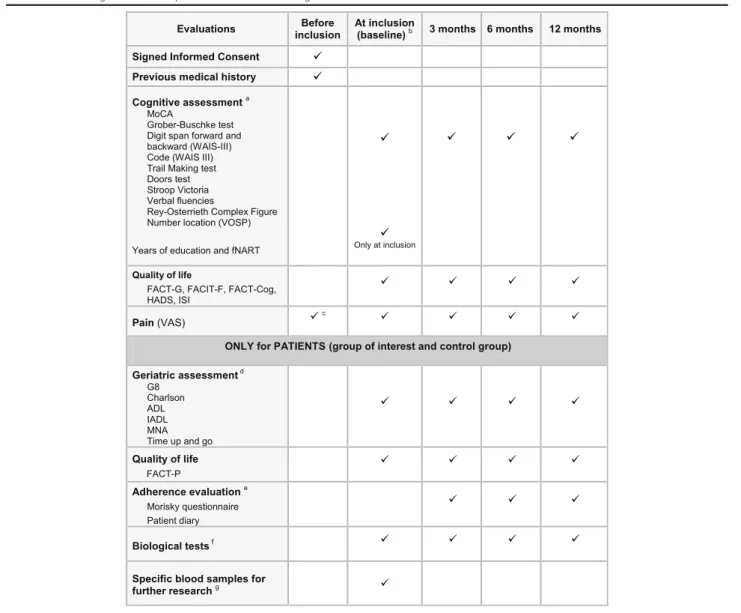HAL Id: inserm-02127779
https://www.hal.inserm.fr/inserm-02127779
Submitted on 13 May 2019
HAL is a multi-disciplinary open access
archive for the deposit and dissemination of
sci-entific research documents, whether they are
pub-lished or not. The documents may come from
teaching and research institutions in France or
abroad, or from public or private research centers.
L’archive ouverte pluridisciplinaire HAL, est
destinée au dépôt et à la diffusion de documents
scientifiques de niveau recherche, publiés ou non,
émanant des établissements d’enseignement et de
recherche français ou étrangers, des laboratoires
publics ou privés.
Correction to: Impact of new generation
hormone-therapy on cognitive function in elderly
patients treated for a metastatic prostate cancer:
Cog-Pro trial protocol
Marie Lange, Heidi Laviec, Hélène Castel, Natacha Heutte, Alexandra
Leconte, Isabelle Léger, Bénédicte Giffard, Aurélie Capel, Martine Dubois,
Bénédicte Clarisse, et al.
To cite this version:
Marie Lange, Heidi Laviec, Hélène Castel, Natacha Heutte, Alexandra Leconte, et al.. Correction
to: Impact of new generation hormone-therapy on cognitive function in elderly patients treated for
a metastatic prostate cancer: Cog-Pro trial protocol. BMC Cancer, BioMed Central, 2018, 18 (1),
pp.110. �10.1186/s12885-017-3764-9�. �inserm-02127779�
CORRECTION
Open Access
Correction to: Impact of new generation
hormone-therapy on cognitive function in
elderly patients treated for a metastatic
prostate cancer: Cog-Pro trial protocol
Marie Lange
1,2,3, Heidi Laviec
4, Hélène Castel
3,5, Natacha Heutte
1,2, Alexandra Leconte
2, Isabelle Léger
1,3,6,7,
Bénédicte Giffard
3,8, Aurélie Capel
2, Martine Dubois
3,5, Bénédicte Clarisse
2, Elodie Coquan
2,4, Frédéric Di Fiore
9,10,
Sophie Gouérant
9,10, Philippe Bartélémy
11, Laure Pierard
11, Karim Fizazi
12and Florence Joly
1,2,3,13*Correction
After publication of the original article [1] the authors
found that Table 2 had been formatted incorrectly,
meaning that some rows in the Table did not display the
correct information.
An updated version of Table 2 is included with this
Correction.
The original article has also been updated.
Author details
1INSERM, U1086 ANTICIPE, Normandie University, UNICAEN, 14076 Caen, France. 2Clinical Research Department, Centre François Baclesse, 14076 Caen, France. 3Cancer and Cognition Platform, Ligue Nationale Contre le Cancer, 14076 Caen,
France.4Medical Oncology Department, Centre François Baclesse, 14076 Caen,
France.5Laboratory of Neuronal and Neuroendocrine Differentiation and
Communication, Normandie University, UNIROUEN, INSERM, DC2N, 76000 Rouen, France.6UPO, Gustave Roussy, 94800 Villejuif, France.7NeuroHIV
Rehabilitation Unit, Bicêtre University Hospital, 94275 Le Kremlin Bicêtre, France.
8Normandie University, UNICAEN, EPHE Paris, INSERM, U1077, 14000 Caen,
France.9Medical Oncology Department, Centre Henri-Becquerel, 76000 Rouen,
France.10Digestive and Urology Oncology Unit, Rouen University Hospital,
76000 Rouen, France.11Medical Oncology and Hematology Department,
Hôpitaux Universitaires de Strasbourg, 67000 Strasbourg, France.12Medical
Oncology Department, Gustave Roussy, 94800 Villejuif, France.13Medical
Oncology Department, CHU de Caen, 14000 Caen, France.
Received: 9 November 2017 Accepted: 9 November 2017
Reference
1. Lange M, Laviec H, Castel H, Heutte N, Leconte A, Léger I, Giffard B, Capel A, Dubois M, Clarisse B, Coquan E, Di Fiore F, Gouérant S, Bartélémy P, Pierard L, Karim F, Joly F. Impact of new generation hormone-therapy on cognitive function in elderly patients treated for a metastatic prostate cancer: Cog-Pro trial protocol. BMC Cancer. 2017;17: 549. https://doi.org/10.1186/s12885-017-3534-8.
* Correspondence:f.joly@baclesse.unicancer.fr
1INSERM, U1086 ANTICIPE, Normandie University, UNICAEN, 14076 Caen, France 2Clinical Research Department, Centre François Baclesse, 14076 Caen, France
© The Author(s). 2018 Open Access This article is distributed under the terms of the Creative Commons Attribution 4.0 International License (http://creativecommons.org/licenses/by/4.0/), which permits unrestricted use, distribution, and reproduction in any medium, provided you give appropriate credit to the original author(s) and the source, provide a link to the Creative Commons license, and indicate if changes were made. The Creative Commons Public Domain Dedication waiver (http://creativecommons.org/publicdomain/zero/1.0/) applies to the data made available in this article, unless otherwise stated.
Langeet al. BMC Cancer (2018) 18:110 DOI 10.1186/s12885-017-3764-9
Table 2 Used cognitive tests, questionnaires and biological tests
MoCA Montreal Cognitive Assessment, WAIS Wechsler Adult Intelligence Scale, VOSP Visual Object and Space Perception Battery, fNART French National Adult Reading Test,ISI Insomnia Severity Index, VAS Visual Analog Scale, ADL Activities of Daily Living, IADL Instrumental Activities of Daily Living, MNA
Mini-Nutritional Assessment
a
Cognitive assessment will be performed by neuropsychologists
b
For group of interest patients: before the start of the treatment or within 15 days after the start of treatment by abiraterone acetate or enzalutamide
c
Had to be≤3 on the 0–10 pain VAS scale to meet with inclusion pain criteria
d
Geriatric assessment will be performed by a study nurse specialized in geriatric
e
Adherence evaluation will be performed only in group of interest patients
f
At each time: CBC, platelets, albumin, CRP, prealbumin, iron, ferritin, transferrin, creatinin, sodium, potassium, ALT, AST, GGT, ALP, total bilirubin, TSH, T4, testosterone. At inclusion only: cortisol (at 8 h AM, fasting)
g
1 EDTA (5 ml), 1 dry tube with gel (5 ml) and 1 dry tube without gel (5 ml)
